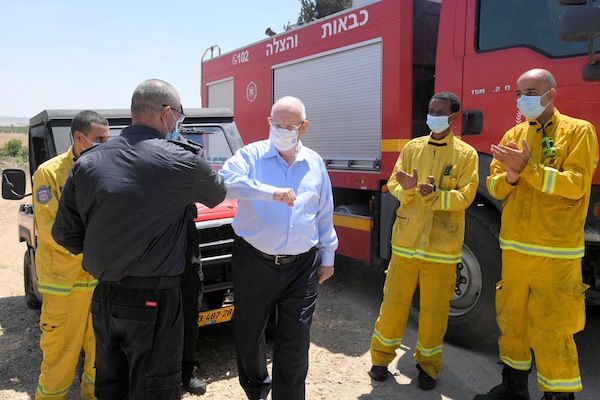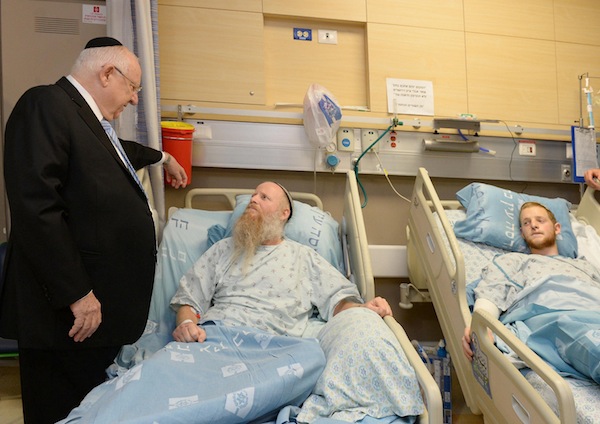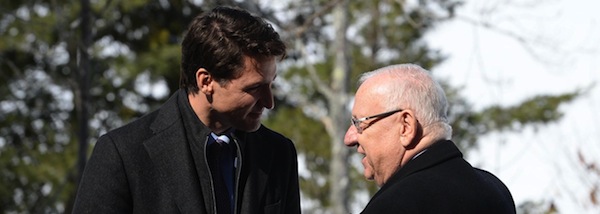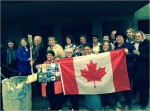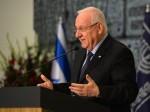Canada’s Foreign Minister John Baird, left, meets with Israeli Prime Minister Binyamin Netanyahu earlier this week. (photo by Kobi Gideon/GPO)
After a hostile greeting by protesters in the Palestinian Authority capital of Ramallah, who pelted his convoy with shoes and eggs, Canadian Foreign Minister John Baird returned to Jerusalem to meet with Israeli Prime Minister Binyamin Netanyahu, Foreign Minister Avigdor Lieberman and President Reuven Rivlin.
According to reports, Ramallah activists carried signs reading “Baird you are not welcome in Palestine.” Baird has opposed the PA’s bid for war crimes charges against Israel and other moves by the PA at the United Nations. Ottawa has also been vocally supportive of Israel during Stephen Harper’s tenure.
The foreign minister’s visit came on the anniversary of Harper’s tour of the region in 2014. Baird hoped to reaffirm Canada’s commitment to the strategic partnership and agreements forged on that visit. “Canada deeply values its close ties with Israel,” Baird said prior to his trip.
Baird traveled to Ramallah Sunday morning to meet with PA Foreign Minister Riyad al-Maliki. At that meeting, which Baird called “cordial and constructive,” Baird and Maliki discussed Canada’s “desire for a future of peace and prosperity, stability and security for both Palestinians and Israelis.”
Baird said Canada considers itself a “friend” to both Israel and the Palestinian Authority. “As friends, we have candid and frank exchanges on areas where we differ in opinion,” he said, adding that he asked Maliki to “strongly reconsider the consequences of moving forward with any action that may be counterproductive to a negotiated solution with the state of Israel.”
Last week, the PA brought war crimes charges against Israel at the International Criminal Court in The Hague, along with ongoing efforts to seek sanctions at the UN. Baird said these moves, “will not contribute to peace and security in the region.”
As Canadians, said Baird, “we strongly support Israel’s right to defend itself, and we will play our part to defend Israel from international attempts to delegitimize it.”
“Canada believes strongly in a two-state solution between Israel and the Palestinian Authority,” Baird said prior to the trip. “Negotiations provide the only viable path to lasting peace.”
Returning from Ramallah Sunday afternoon, Baird met privately with Lieberman.
Lieberman has earned scorn with his plan to annex Israeli Arab villages to the PA. Under Lieberman’s plan, only those Arab citizens who moved to Israeli-controlled areas and pledged loyalty to the state of Israel would retain their current citizenship. Once considered a contender for prime minister, Lieberman’s chances have been diminished considerably by recent corruption allegations.
The ministers jointly signed four memoranda of understanding and agreements, including a declaration of solidarity and friendship, and a declaration on trade that Baird said aims “to double the value of our [countries’] commercial relationship.”
Baird said that with the rise of worldwide terrorism, including October’s attack on the Parliament buildings in Ottawa, “the relationship between Canada and Israel is stronger than ever been, and getting stronger every day.”
Business development between the two countries will be targeted specifically in the area of defence, security and cyber security, Baird said.
Canadian Ambassador Vivian Bercovici and other official representatives from both countries remained after Baird’s departure for award presentations to the 10 finalists of Grand Challenges Israel (GCI). Inspired by Grand Challenges Canada (GCC), which is led by chief executive officer Peter Singer, who received the Order of Canada in 2011, GCI rewards entrepreneurs for advances in affordable health care for the developing world. Finalists, chosen from more than 100 entries, presented innovations in water purification, disease diagnosis and an affordable wheelchair for children. Worldwide, the Grand Challenges initiative was launched by the Bill and Melinda Gates Foundation in 2003.
Baird’s trip to the region included a stop in Egypt, which he visited prior to the Israel leg of his trip. There, he met with Foreign Minister Sameh Shoukry but failed to ensure the release of Canadian-Egyptian journalist Mohamed Fahmy, convicted for being a member of the Muslim Brotherhood, a group that is now banned in Egypt.
A year ago, on Jan. 20, Harper became the first Canadian prime minister to speak in the Knesset. His remarks about Israel’s right to exist and defend itself received a standing ovation, along with jeers and catcalls from Israeli Arab MKs who walked out in protest. On that visit, Harper pledged millions of dollars in increased support for the PA. Although Harper’s visit was well received by the Israeli media, the Canadian press was critical of Harper’s large delegation and “rigid” pro-Israel stance.
Baird’s Israel agenda originally included stops at the Dome of the Rock and the Al-Aqsa Mosque, both atop the Temple Mount area behind the Western Wall in Jerusalem. No reason was given for the decision to cancel visits there. Harper canceled a similar visit a year ago.
Baird met Netanyahu on Monday afternoon before leaving Israel. He continued to Davos, Switzerland, to attend the 2015 World Economic Forum from Jan. 21-24.
– For more national Jewish news, visit cjnews.com.

